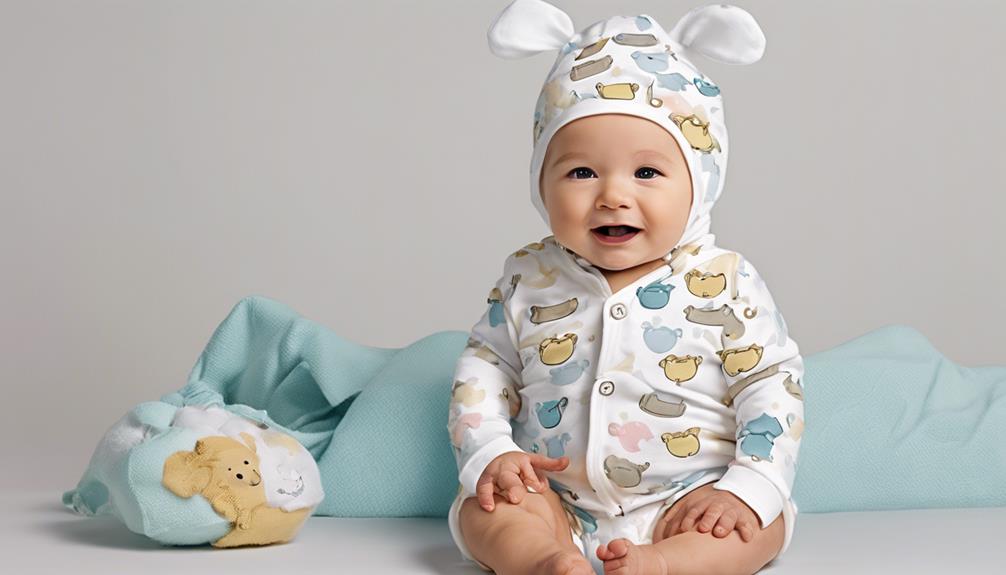As we navigate the world of newborn care, it's like trying to predict the weather – sometimes unpredictable and ever-changing.
Have you ever wondered how many times a newborn should poop in a day? Well, let's just say it's a topic that can raise eyebrows and prompt discussions among new parents.
But before we jump to conclusions, there's more to ponder beyond just the number of dirty diapers.
Stay tuned as we uncover the nuances of newborn pooping habits and what's deemed normal in this mysterious domain of infant bowel movements.
Key Takeaways
- Breastfed newborns typically poop 3-5 times daily due to easily digestible breast milk.
- Formula-fed babies usually have 1-4 bowel movements daily.
- Changes in poop frequency are normal as the digestive system matures.
- Consulting a healthcare provider is advised if a newborn hasn't pooped in four days.
Factors Affecting Newborn Poop Frequency
Breastfed newborns generally tend to have more frequent bowel movements, typically averaging around 3-5 times a day. This difference in poop frequency between breastfed and formula-fed babies is due to the composition of breast milk, which is easier to digest. The digestive system of a newborn plays an important role in how often they poop. Some babies may have a bowel movement after each feeding, while others may go a day or two without pooping. Individual metabolism also influences poop frequency; some babies have a faster digestive process than others.
Monitoring a newborn's poop consistency and frequency is essential for evaluating their overall health. If there are significant changes in poop frequency or consistency, consulting a pediatrician is recommended. The color, texture, and odor of a newborn's poop can provide valuable insights into their well-being. Understanding these factors can help caregivers identify any potential issues early on and guarantee the baby's health and comfort.
Normal Newborn Poop Frequency Range

The typical range for newborn poop frequency in the first few weeks after birth is 2-5 times a day. Understanding what's normal for a newborn's poop frequency can help caregivers monitor their well-being effectively.
Here are three key points to ponder:
- Breastfed babies may poop more frequently: Since breast milk is easily digestible, breastfed newborns might have bowel movements after each feeding. This can result in them pooping multiple times a day, which is usually healthy and expected.
- Formula-fed babies might poop slightly less often: Formula-fed babies tend to have slightly less frequent bowel movements compared to breastfed babies, typically ranging from 1-4 times a day. This variance is normal and reflects differences in digestion between breast milk and formula.
- Shift over time: After the first month, some newborns may start pooping less frequently, shifting to once a day or even once a week. This change is often due to the maturation of the digestive system and is generally considered within the normal range of newborn poop frequency.
Signs of Healthy Newborn Poop
When evaluating the health of a newborn, observing the frequency and consistency of their bowel movements is important for determining their well-being. Healthy newborns typically have bowel movements 2-5 times a day in the first few weeks of life. Breastfed babies often poop more frequently than formula-fed babies.
Passing meconium within the first 24 hours is a positive sign that the baby's digestive system is functioning well. With regard to texture, newborn poop that's soft and has a seedy consistency is usually a good indicator of a healthy newborn.
It's essential to pay attention to any changes in poop color as it can sometimes indicate underlying health issues that may need to be addressed promptly. By monitoring the frequency, texture, and color of your baby's poop, you can gain valuable insights into their overall health and well-being.
When to Seek Medical Advice

If a newborn hasn't had a bowel movement in four days, it's important to seek medical advice promptly to address potential constipation concerns. Constipation in newborns can cause discomfort and distress, so it's vital to monitor their poop frequency and consistency closely.
Here are three key points to ponder when deciding whether to seek medical guidance regarding your newborn's poop patterns:
- Changes in Frequency: If there's a significant change in the frequency of your newborn's bowel movements, especially if they haven't pooped in several days, consulting a healthcare provider is recommended to rule out any underlying issues.
- Consistency Concerns: If you notice that your newborn's poop is consistently hard, dry, or difficult to pass, it could indicate constipation. Seeking medical advice in such cases can help address the problem before it escalates.
- Signs of Discomfort: Should your baby display signs of discomfort or distress while passing stool, such as crying or straining, it's advisable to promptly consult a pediatrician to guarantee your baby's well-being.
Monitoring Newborn Poop Patterns
Monitoring newborn poop patterns involves observing the frequency and consistency of bowel movements to make sure the baby's digestive health is on track. Newborns typically pass meconium in the first 24-48 hours after birth, indicating proper bowel function.
In the early weeks of life, infants usually have bowel movements 2-5 times a day. Breastfed babies may poop more frequently, even after every feeding, which is normal. On the other hand, formula-fed babies tend to have fewer bowel movements compared to breastfed babies.
It's important to monitor any changes in poop frequency closely. If there are concerns about the baby's poop patterns, consulting a pediatrician is recommended. By consistently monitoring your baby's bowel movements, you can make sure that they're healthy and their digestive system is functioning as it should.
Frequently Asked Questions
How Many Poopy Diapers Is Too Many for a Newborn?
We monitor newborns closely for any signs of distress or unusual bowel patterns. Consult a pediatrician if there are concerns about the frequency of poopy diapers. We aim to provide reliable guidance for new parents.
How Many Poop per Day Is Normal for Newborn?
It is common knowledge that newborns typically poop 2-5 times daily. Breastfed babies may go even more frequently, while formula-fed ones a bit less. But every baby is unique, so consulting a pediatrician for poop concerns is wise.
How Many Times Should a Newborn Poop a Day on Breast Milk?
We've noticed breastfed newborns often poop 3-4 times daily initially, due to easily digestible breast milk. Poop frequency may decrease to once a day or even weekly after the first month. Monitoring wet diapers helps confirm baby's hydration and milk intake.
How Do I Know if My Newborn Is Pooping Too Much?
We monitor newborn poop for signs of potential issues. If frequent pooping seems excessive or irregular, we consult a pediatrician. Trusting medical advice is essential. Stay vigilant for any sudden changes; a professional's guidance is invaluable.
Conclusion
To sum up, understanding your newborn's poop patterns is essential for monitoring their health.
For example, my friend's baby, who was exclusively breastfed, pooped multiple times a day, indicating a healthy digestive system.
By keeping a close eye on your baby's poop frequency, consistency, and color, you can guarantee they're thriving and address any concerns promptly.
Remember, consulting your pediatrician for any questions or worries about your baby's bowel movements is always a good idea.









